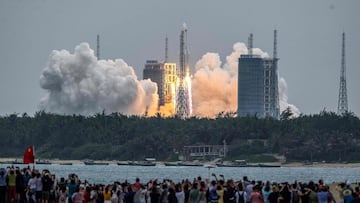Chinese rocket launch failure: what happened and what are the consequences?
Debris from a spacecraft used to build China's new Tianhe space station is expected to crash back to earth on Saturday, although experts are unsure exactly where it will land.

Debris from a Chinese space craft is expected to come crashing back down to earth in the coming days as scientists scramble to pinpoint the expected location of the impact.
The 100ft-long piece of space junk is thought to be from a rocket used in the building of China’s new Tianhe space station, which began construction last year.
The debris is currently orbiting the planet at a rate of roughly once every 90 minutes, giving it an average speed of about 17,324 mile per hour. The matter was fired into orbit using a 46,000-pound Chinese rocket, known as Long March-5B, but the rocket’s core has deviated from the planned path on its return to earth.
Where will the Chinese rocket land on earth?
The most recent projections from the Aerospace Corp suggests that the rocket will likely land in the Pacific Ocean on Saturday 8 May, at around 11pm Eastern Time. But with so many factors dictating the rocket’s dissent others have given a time range between Friday evening and Sunday night.
Currently the rocket’s orbit is covering a huge area and experts have been unable to pinpoint an exact landing spot. The European Space Agency believes that any debris that survives re-entering the earth’s atmosphere will land in a strip between 41 degrees north and 41 degrees south, a vast area covering southern Spain and Portugal, right down to parts of Australia.
However with such a vast area as a potential landing spot experts believe that there is little danger to human life, given that a fairly small proportion of the earth’s surface is habited. Roughly three-quarters is sea and the vast majority of land mass is not home to people.
What has the White House said about the Chinese rocket?
In response to the news the White House struck a cautious tone, calling for “responsible space behaviours”. Diplomatic ties with China will be a key focus of the Biden administration and with another ten similar trips expected to be undertaken by the Chinese space programme to complete the space station, this issue may rear its head again in future.
Jen Psaki, White House press secretary, told reporters on Wednesday: “The United States is committed to addressing the risks of growing congestion due to space debris and growing activity in space and we want to work with the international community to promote leadership and responsible space behaviours.”
The US Defence Department has echoed the predictions made by the Aerospace Corp and believes that the debris will land some time on Saturday evening. However a statement from the Pentagon said that the landing location “cannot be pinpointed until within hours of its re-entry”.






